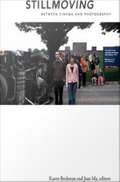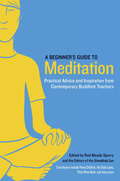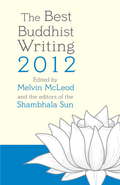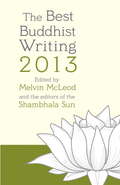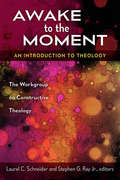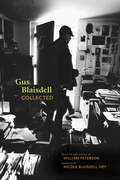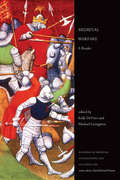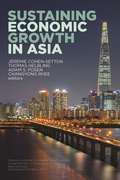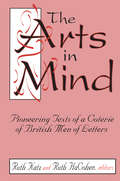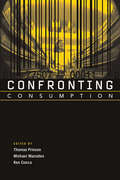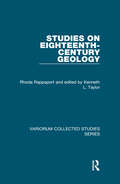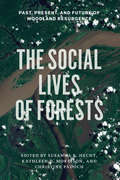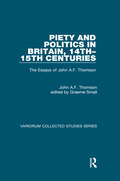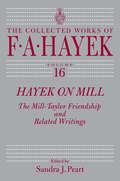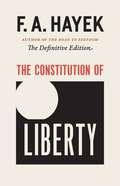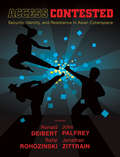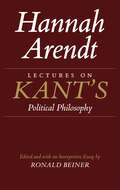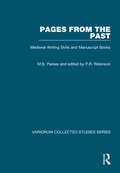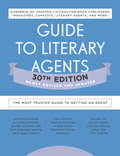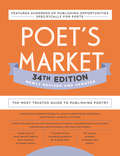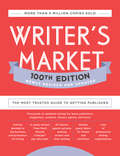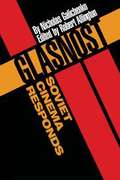- Table View
- List View
The Creation of Iraq, 1914-1921
by Eleanor H. Tejirian Simon Reeva Spector eds. Foreword by Gary SickLeading scholars consider Iraq's history and strategic importance from the vantage point of its residents, neighbors (Iran, Turkey, and Kurdistan), and the Great Powers.
Still Moving: Between Cinema and Photography
by eds. Karen Beckman Jean MaIn Still Moving noted artists, filmmakers, art historians, and film scholars explore the boundary between cinema and photography. The interconnectedness of the two media has emerged as a critical concern for scholars in the field of cinema studies responding to new media technologies, and for those in the field of art history confronting the ubiquity of film, video, and the projected image in contemporary art practice. Engaging still, moving, and ambiguous images from a wide range of geographical spaces and historical moments, the contributors to this volume address issues of indexicality, medium specificity, and hybridity as they examine how cinema and photography have developed and defined themselves through and against one another. Foregrounding the productive tension between stasis and motion, two terms inherent to cinema and to photography, the contributors trace the shifting contours of the encounter between still and moving images across the realms of narrative and avant-garde film, photography, and installation art. Still Moving suggests that art historians and film scholars must rethink their disciplinary objects and boundaries, and that the question of medium specificity is a necessarily interdisciplinary question. From a variety of perspectives, the contributors take up that challenge, offering new ways to think about what contemporary visual practice is and what it will become. Contributors: George Baker, Rebecca Baron, Karen Beckman, Raymond Bellour, Zoe Beloff,Timothy Corrigan, Nancy Davenport, Atom Egoyan, Rita Gonzalez, Tom Gunning, Louis Kaplan, Jean Ma, Janet Sarbanes, Juan A. Surez
A Beginner's Guide to Meditation: Practical Advice and Inspiration from Contemporary Buddhist Teachers
by Thich Nhat Hanh Sakyong Mipham Pema Chodron editors of the Shambhala Sun Rod Meade SperryAs countless meditators have learned firsthand, meditation practice can positively transform the way we see and experience our lives. This practical, accessible guide to the fundamentals of Buddhist meditation introduces you to the practice, explains how it is approached in the main schools of Buddhism, and offers advice and inspiration from Buddhism's most renowned and effective meditation teachers, including Pema Chödrön, Thich Nhat Hanh, the Fourteenth Dalai Lama, Sharon Salzberg, Norman Fischer, Ajahn Chah, Chögyam Trungpa Rinpoche, Shunryu Suzuki Roshi, Sylvia Boorstein, Noah Levine, Judy Lief, and many others. Topics include how to build excitement and energy to start a meditation routine and keep it going, setting up a meditation space, working with and through boredom, what to look for when seeking others to meditate with, how to know when it's time to try doing a formal meditation retreat, how to bring the practice "off the cushion" with walking meditation and other practices, and much more.
The Best Buddhist Writing 2012
by Melvin Mcleod editors of the Shambhala SunA treasury of the most notable, profound, and thought-provoking Buddhist-inspired writing published in the last year. The Best Buddhist Writing 2012 includes: * His Holiness the Dalai Lama on cultivating a universal ethic of kindness * Sharon Salzberg on getting your meditation practice started * Pema Chödrön on how to smile at fear * The Venerable Bhikkhu Bodhi on analyzing global problems through the lens of traditional Buddhist teachings * Bruce Rich on the enlightened model of government of the Buddhist monarch King Ashoka * Thich Nhat Hanh on fidelity in loving relationships * Michael A. Stusser's determined--and hilarious--effort to speak--and tweet--no evil * Norman Fischer on a new and more open understanding of language * Barry Boyce's fascinating survey of the life and teachings of the late Chögyam Trungpa Rinpoche * Michael Stone and David Loy on the basic questions raised by the Occupy Wall Street movement * Khenchen Thrangu Rinpoche's explanation of the meditation practice of kusulu, the pinnacle of simplicity and relaxation * Nancy Baker on the powerful and useful energy behind anger * Diane Ackerman on living with her beloved husband's Alzheimer's disease * Yangzom Brauen's moving account of her grandmother and mother's escape from Tibet following the Chinese invasion * And much more
The Best Buddhist Writing 2013
by Natalie Goldberg Melvin Mcleod Pema Chodron Lodro Rinzler editors of the Shambhala SunA thought-provoking collection of the most notable and insightful Buddhism-inspired writing published in the last year: * Thich Nhat Hanh's vision for a more enlightened and sustainable society * Ezra Bayda on avoiding the pitfalls that arise on the path of meditation * Tsoknyi Rinpoche's powerful Dzogchen practices that help you to discover your mind's inherent awareness and clarity * Lodro Rinzler on what happens when the Buddha walks into a bar * Karen Maezen Miller on the virtues of boredom * Phillip Moffitt on how to transform emotional chaos into confidence and clarity * Joseph Goldstein's unique nine-minute meditation practice that you can incorporate into your busy day * Elihu Genmyo Smith on being still * Pema Chödrön on how to become a bodhisattva * Sakyong Mipham on how mind, breath, and energy work together in meditation to transform your life * Judy Lief on the fifty-nine ancient slogans that can help you be more skillful and loving in all your relationships * Bonnie Friedman on discovering nonattachment while apartment-hopping in Brooklyn * Jules Shuzen Harris on what anger can teach you * Pico Iyer on travel as contemplative practice * And much more
Awake to the Moment: An Introduction To Theology
by Laurel C. Schneider Stephen G. Ray Jr. editorsMost introductory textbooks in theology see their primary task as explaining Christian doctrines that no one quite understands anymore. While this is one of theology's jobs, it is by no means the only, nor even the most important, one. Theology has also been called to change the world, to help people connect deeply rooted beliefs about the world's source and goal to questions of personal meaning and communal thriving. Theology is here to help us make sense of the complex, flawed world into which we've been thrust and to assist us in our attempt to love our neighbors and live toward the common good. For more than forty years, the Workgroup on Constructive Theology has brought the liberal and liberationist theological traditions into creative encounter with lived human experience. In this introduction to the methods and tasks of theology, they invite a new generation of readers, many who will have little or no exposure to Christian doctrine, to see theology as a partner in the struggle for a better world. They demonstrate how theological ideas have "legs," playing themselves out not only in religious communities but in the public square as well. Theology, the authors tell us, is constructive when it joins in God's work of building human lives and human societies. Readers will learn to think about all of life in light of their religious commitments and to see theology as an essential tool for a life well lived.
Gus Blaisdell Collected
by editors William Peterson and Nicole Blaisdell IveyFrom the moment he arrived in New Mexico in 1964, Gus Blaisdell (1935–2003) was a legendary presence. Famous in Albuquerque as a writer, teacher, publisher, editor, and especially as the proprietor of the Living Batch bookstore, Blaisdell was also a brilliant critic whose essays influenced readers throughout the country and across the Atlantic. This long-awaited collection of Blaisdell&’s critical writings includes essays on literature, art, and film, along with moving tributes by some of the distinguished writers who numbered Blaisdell among their friends. Introductory essays by philosopher Stanley Cavell and literary critic David Morris join colleague Ira Jaffe&’s poignant memoir to provide perspectives on the man by friends who knew him well. Glimpses of Blaisdell&’s vivid personality can be had from the many photographs included, and the diligently researched chronology compiled by Nicole Blaisdell Ivey tracks the course of her father&’s complicated life.
Medieval Warfare: A Reader (Readings in Medieval Civilizations and Cultures)
by editors Kelly DeVries Michael LivingstonMedieval Warfare: A Reader examines how armed conflict was experienced in the Middle Ages both on the field of battle and at home. This comprehensive collection of more than 130 primary-source materials—some translated here for the first time—traces over one thousand years of military developments, including the fall of Rome, the fight for Jerusalem, the building of castles and other fortifications, the rise of gunpowder, and the negotiation of treaties. Developed by two of the leading experts in medieval military history, the readings tell stories of terrors and tragedies, triumphs and technologies in the Middle Ages. By reclaiming the voices of victims and veterans that have previously been ignored, the editors stake out a powerful new perspective on the long history of military conflict and suffering.
Sustaining Economic Growth in Asia
by Thomas Helbling editors Adam S. Posen Jérémie Cohen-SettonEconomic growth, inflation, and interest rates have declined in Asia, just as they have in the United States and Europe. Sustaining Economic Growth in Asia explores the relevance to several Asian economies of the diagnosis known as “secular stagnation.” Leading experts on the region discuss the fiscal and monetary policy challenges of reviving growth without generating domestic financial imbalances. The essays on innovation, demographics, spillovers, and various policy proposals are accompanied by case studies focusing on Japan, South Korea, China, India, and Indonesia.
The Arts in Mind: Pioneering Texts of a Coterie of British Men of Letters
by Ruth Katz editors Ruth HaCohenAmajor shift in critical attitudes toward the arts took place in the eighteenth century. The fine arts were now looked upon as a group, divorced from the sciences and governed by their own rules. The century abounded with treatises that sought to establish the overriding principles that differentiate art from other walks of life as well as the principles that differentiate them from each other. This burst of scholarly activity resulted in the incorporation of aesthetics among the classic branches of philosophy, heralding the cognitive turn in epistemology. Among the writings that initiated this turn, none were more important than the British contribution. The Arts in Mind brings together an annotated selection of these key texts.A companion volume to the editors' Tuning the Mind, which analyzed this major shift in world view and its historical context, The Arts in Mind is the first representative sampling of what constitutes an important school of British thought. The texts are neither obscure nor forgotten, although most histories of eighteenth-century thought treat them in a partial or incomplete way. Here they are made available complete or through representative extracts together with an editor's introduction to each selection providing essential biographical and intellectual background. The treatises included are representative of the changed climate of opinion which entailed new issues such as those of perception, symbolic function, and the role of history and culture in shaping the world.>
Confronting Consumption (The\mit Press Ser.)
by Ken Conca Michael Maniates edited by Thomas PrincenComforting terms such as "sustainable development" and "green production" frame environmental debate by stressing technology (not green enough), economic growth (not enough in the right places), and population (too large). Concern about consumption emerges, if at all, in benign ways; as calls for green purchasing or more recycling, or for small changes in production processes. Many academics, policymakers, and journalists, in fact, accept the economists' view of consumption as nothing less than the purpose of the economy. Yet many people have a troubled, intuitive understanding that tinkering at the margins of production and purchasing will not put society on an ecologically and socially sustainable path. Confronting Consumption places consumption at the center of debate by conceptualizing "the consumption problem" and documenting diverse efforts to confront it. In Part 1, the book frames consumption as a problem of political and ecological economy, emphasizing core concepts of individualization and commoditization. Part 2 develops the idea of distancing and examines transnational chains of consumption in the context of economic globalization. Part 3 describes citizen action through local currencies, home power, voluntary simplicity, "ad-busting," and product certification. Together, the chapters propose "cautious consuming" and "better producing" as an activist and policy response to environmental problems. The book concludes that confronting consumption must become a driving focus of contemporary environmental scholarship and activism.
Studies on Eighteenth-Century Geology (Variorum Collected Studies #986)
by Rhoda Rappaport edited by TaylorIn a scholarly career spanning five decades, Rhoda Rappaport published perceptive analyses of science in the culture of early Modern Europe, France in particular, with strong emphasis on geology's early development. Of the sixteen papers in this volume, most focus on aspects of geology's cultivation during the 'long' 18th century, from the times of Hooke, Leibniz, and Fontenelle to those of Lavoisier, Werner, and Cuvier. Among the topics most closely treated here are the French mineralogical mapping project initiated by Guettard; contemporary efforts to interpret the earth historically (such as through Noah's Flood); and difficulties presented by the vocabulary often used in traditional histories of geology. Much of Rappaport's research addressed two problems prevalent within 18th-century earth science: the proper understanding of petrifactions, or fossil objects; and struggles to establish reliable knowledge of the earth's past. She also examined the chemistry of G.-F. Rouelle, which she saw as effectively an attempt at systematic comprehension of the entire mineral realm; trans-national features of scientific pursuits as illustrated in the careers of the naturalist Vallisneri and the mineralogist (and philosophe) d'Holbach; and aspects of science's promotion in France through government patronage and academic privilege.
The Social Lives of Forests: Past, Present, and Future of Woodland Resurgence
by Christine Padoch edited by Susanna B. Hecht Kathleen D. MorrisonForests are in decline, and the threats these outposts of nature face--including deforestation, degradation, and fragmentation--are the result of human culture. Or are they? This volume calls these assumptions into question, revealing forests' past, present, and future conditions to be the joint products of a host of natural and cultural forces. Moreover, in many cases the coalescence of these forces--from local ecologies to competing knowledge systems--has masked a significant contemporary trend of woodland resurgence, even in the forests of the tropics. Focusing on the history and current use of woodlands from India to the Amazon, The Social Lives of Forests attempts to build a coherent view of forests sited at the nexus of nature, culture, and development. With chapters covering the effects of human activities on succession patterns in now-protected Costa Rican forests; the intersection of gender and knowledge in African shea nut tree markets; and even the unexpectedly rich urban woodlands of Chicago, this book explores forests as places of significant human action, with complex institutions, ecologies, and economies that have transformed these landscapes in the past and continue to shape them today. From rain forests to timber farms, the face of forests--how we define, understand, and maintain them--is changing.
Piety and Politics in Britain, 14th–15th Centuries: The Essays of John A.F. Thomson (Variorum Collected Studies #1020)
by John A.F. Thomson edited by SmallThis volume explores a range of topics during a turbulent period in British history, with particular emphasis on political change and popular piety. On the eve of the Reformation, religious beliefs were shaped by a church which was falling under the growing control of the state, and by responses to England's one and only heretical movement, Lollardy. In political life, gradual disengagement from a cross-Channel political world was followed by civil war and the eventual rise of a strong Tudor monarchy. As this volume demonstrates in a number of ways, the impact of many of these macro changes was felt across the British Isles, not just in England. But the studies presented here frequently explore major change through the experience of the middling sort: the gentry active in local government, the English merchants and Scottish immigrants making important life choices in major cities, or the industrious clerics charged with the routine administration of the church. By looking at the case studies of these men in more detail, we begin to appreciate that even in this age of great change, there were profound continuities which carried through into the sixteenth century. Along the way, too, new light is thrown on the authorship, date and redaction of texts which continue to shape our understanding of late medieval British history.
Studies in Medieval Shi'ism (Variorum Collected Studies)
by Wilferd Madelung edited by SchmidtkeThis volume complements the selections of Wilferd Madelung's articles previously published by Variorum (Religious Schools and Sects in Medieval Islam, and Religious and Ethnic Movements in Medieval Islam). The first articles here examine legal and political aspects of early Shi`ism. The following studies relate to doctrinal views of the Zaydi imams al-Qasim b. Ibrahim al-Rassi and al-Natiq bi-l-Haqq and to Zaydi attitudes to Sufism. The final group focuses on the Isma`iliyya, their social and political history and aspects of their religious thought. A detailed index completes the volume.
Hayek on Mill: The Mill-Taylor Friendship and Related Writings (The Collected Works of F. A. Hayek #16)
by Friedrich A. Hayek Sandra J. Peart edited by Sandra J. PeartBest known for reviving the tradition of classical liberalism, F. A. Hayek was also a prominent scholar of the philosopher John Stuart Mill. One of his greatest undertakings was a collection of Mill's extensive correspondence with his longstanding friend and later companion and wife, Harriet Taylor-Mill. Hayek first published the Mill-Taylor correspondence in 1951, and his edition soon became required reading for any study of the nineteenth-century foundations of liberalism. This latest addition to the University of Chicago Press's Collected Works of F. A. Hayek series showcases the fascinating intersections between two of the most prominent thinkers from two successive centuries. Hayek situates Mill within the complex social and intellectual milieu of nineteenth-century Europe-as well as within twentieth-century debates on socialism and planning-and uncovers the influence of Taylor-Mill on Mill's political economy. The volume features the Mill-Taylor correspondence and brings together for the first time Hayek's related writings, which were widely credited with beginning a new era of Mill scholarship.
Vision In Verse
by edited by S.P.S. DahiyaAn Anthology of Poems For B.A. Second Year Students of Kurukshetra University, Kurukshetra and Maharishi Dayanand University, Rohtak edited by S.P.S. Dahiya
The Constitution of Liberty: The Definitive Edition
by Friedrich A. Hayek edited by Ronald HamowyFrom the $700 billion bailout of the banking industry to president Barack Obama's $787 billion stimulus package to the highly controversial passage of federal health-care reform, conservatives and concerned citizens alike have grown increasingly fearful of big government. Enter Nobel Prize-winning economist and political theorist F. A. Hayek, whose passionate warning against empowering states with greater economic control, The Road to Serfdom, became an overnight sensation last summer when it was endorsed by Glenn Beck. The book has since sold over 150,000 copies. The latest entry in the University of Chicago Press's series of newly edited editions of Hayek's works, The Constitution of Liberty is, like Serfdom, just as relevant to our present moment. The book is considered Hayek's classic statement on the ideals of freedom and liberty, ideals that he believes have guided--and must continue to guide--the growth of Western civilization. Here Hayek defends the principles of a free society, casting a skeptical eye on the growth of the welfare state and examining the challenges to freedom posed by an ever expanding government--as well as its corrosive effect on the creation, preservation, and utilization of knowledge. In opposition to those who call for the state to play a greater role in society, Hayek puts forward a nuanced argument for prudence. Guided by this quality, he elegantly demonstrates that a free market system in a democratic polity--under the rule of law and with strong constitutional protections of individual rights--represents the best chance for the continuing existence of liberty. Striking a balance between skepticism and hope, Hayek's profound insights are timelier and more welcome than ever before. This definitive edition of The Constitution of Liberty will give a new generation the opportunity to learn from his enduring wisdom.
Access Contested: Security, Identity, and Resistance in Asian Cyberspace (Information Revolution and Global Politics)
by John Palfrey Rafal Rohozinski Jonathan L. Zittrain Ronald Deibert edited by Ronald DeibertExperts examine censorship, surveillance, and resistance across Asia, from China and India to Malaysia and the Philippines. A daily battle for rights and freedoms in cyberspace is being waged in Asia. At the epicenter of this contest is China—home to the world's largest Internet population and what is perhaps the world's most advanced Internet censorship and surveillance regime in cyberspace. Resistance to China's Internet controls comes from both grassroots activists and corporate giants such as Google. Meanwhile, similar struggles play out across the rest of the region, from India and Singapore to Thailand and Burma, although each national dynamic is unique. Access Contested, the third volume from the OpenNet Initiative (a collaborative partnership of the Citizen Lab at the University of Toronto's Munk School of Global Affairs, the Berkman Center for Internet and Society at Harvard University, and the SecDev Group in Ottawa), examines the interplay of national security, social and ethnic identity, and resistance in Asian cyberspace, offering in-depth accounts of national struggles against Internet controls as well as updated country reports by ONI researchers.The contributors examine such topics as Internet censorship in Thailand, the Malaysian blogosphere, surveillance and censorship around gender and sexuality in Malaysia, Internet governance in China, corporate social responsibility and freedom of expression in South Korea and India, cyber attacks on independent Burmese media, and distributed-denial-of-service attacks and other digital control measures across Asia.
Lectures on Kant's Political Philosophy
by Hannah Arendt edited by Ronald BeinerHannah Arendt's last philosophical work was an intended three-part project entitled The Life of the Mind. Unfortunately, Arendt lived to complete only the first two parts, Thinking and Willing. Of the third, Judging, only the title page, with epigraphs from Cato and Goethe, was found after her death. As the titles suggest, Arendt conceived of her work as roughly parallel to the three Critiques of Immanuel Kant. In fact, while she began work on The Life of the Mind, Arendt lectured on "Kant's Political Philosophy," using the Critique of Judgment as her main text. The present volume brings Arendt's notes for these lectures together with other of her texts on the topic of judging and provides important clues to the likely direction of Arendt's thinking in this area.
Pages from the Past: Medieval Writing Skills and Manuscript Books (Variorum Collected Studies #1000)
by M.B. Parkes edited by RobinsonIn the present collection of articles by Malcolm Parkes two overarching concerns emerge: the palaeography of manuscript books in relation to what Parkes has previously called the 'grammar of legibility'; and the importance of considering the circumstances in which medieval books were produced, copied and read. The individual studies discuss the handwriting of individual scribes, and the evidence script can provide of the circumstances of a book's production, the effect of punctuation and layout of text on the reader's interpretation of a work, and the provision and production of books for communities of readers, both clerical and academic. From a discussion of the scribe of the Hereford Mappa Mundi to a comprehensive study of book provision in the medieval University of Oxford, a wealth of information is conveyed in these articles, now conveniently accessible in one volume, about books and their histories by one of the most knowledgeable of manuscript scholars today.
Guide to Literary Agents 30th Edition
by edited by Robert Lee BrewerThe Best Resource Available for Finding a Literary Agent, fully revised and updatedNo matter what you're writing--fiction or nonfiction, books for adults or children--you need a literary agent to get the best book deal possible from a traditional publisher. Guide to Literary Agents 30th edition is your go-to resource for finding that literary agent and earning a contract from a reputable publisher. Along with listing information for more than 1,000 agents who represent writers and their books, the 30th edition of GLA includes: • Hundreds of updated listings for literary agents and writing conferences • Informative articles on crafting effective queries, synopses, and book proposals (and the agent query tracker) • Plus, a 30-Day Platform Challenge to help writers build their writing platforms • Includes 20 literary agents actively seeking writers and their writing
Poet's Market 34th Edition: The Most Trusted Guide to Publishing Poetry
by edited by Robert Lee BrewerThe Most Trusted Guide to Publishing Poetry, fully revised and updatedWant to get your poetry published? There's no better tool for making it happen than Poet's Market, which includes hundreds of publishing opportunities specifically for poets, including listings for book and chapbook publishers, print and online poetry publications, contests, and more. These listings include contact information, submission preferences, insider tips on what specific editors want, and--when offered--payment information. In addition to the completely updated listings, the 34th edition of Poet's Market offers: • Hundreds of updated listings for poetry-related book publishers, publications, contests, and more • Insider tips on what specific editors want and how to submit poetry • Articles devoted to the craft and business of poetry, including how to track poetry submissions, perform poetry, and find more readers • 77 poetic forms, including guidelines for writing them • 101 poetry prompts to inspire new poetry
Writer's Market 100th Edition: The Most Trusted Guide to Getting Published
by edited by Robert Lee BrewerThe most trusted guide to getting published, fully revised and updatedWant to get published and paid for your writing? Let Writer's Market, 100th edition guide you through the process. It's the ultimate reference with thousands of publishing opportunities for writers, listings for book publishers, consumer and trade magazines, contests and awards, and literary agents—as well as new playwriting and screenwriting sections, along with contact and submission information. Beyond the listings, you'll find articles devoted to the business and promotion of writing. Discover 20 literary agents actively seeking writers and their writing, how to develop an author brand, and overlooked funds for writers. This 100th edition also includes the ever-popular pay-rate chart and book publisher subject index.You'll gain access to: Thousands of updated listings for book publishers, magazines, contests, and literary agentsArticles devoted to the business and promotion of writingA newly revised "How Much Should I Charge?" pay rate chartSample query letters for fiction and nonfictionLists of professional writing organizations
Glasnost--Soviet Cinema Responds
by Nicholas Galichenko edited by Robert AllingtonWith the coming of glasnost to the Soviet Union, filmmakers began to explore previously forbidden themes, and distributors released films that were suppressed by pre-glasnost-era censors. Soviet cinema underwent a revolution, one that mirrors and helps interpret the social revolution that took place throughout the USSR. Glasnost-Soviet Cinema Responds is the first overall survey of the effects of this revolution on the work of Soviet filmmakers and their films. The book is structured as a series of three essays and a filmography of the directors of glasnost cinema. The first essay, "The Age of Perestroika," describes the changes that occurred in Soviet cinema as it freed itself from the legacy of Stalinism and socialist realism. It also considers the influence of film educator and director Mikhail Romm. "Youth in Turmoil" takes a sociological look at films about youth, the most dynamic and socially revealing of glasnost-era productions. "Odysseys in Inner Space" charts a new direction in Soviet cinema as it focuses on the inner world of individuals. The filmography includes thirty-three of the most significant glasnost-era directors, including Tengiz Abuladze, Karen Shakhnazarov, and Sergei Soloviev, with a comprehensive list of their films. Discussions of many individual films, such as Repentance, The Messenger Boy, and The Wild Pigeon, and interviews with the directors reveal the effects that glasnost and perestroika have had on the directors' lives and art.

